Criminal Law Report: Analyzing Intention and Motive in Criminal Acts
VerifiedAdded on 2020/06/04
|6
|1732
|401
Report
AI Summary
This report provides a comprehensive overview of the concepts of intention and motive within the framework of criminal law. It begins by defining crime and its essential elements, actus reus and mens rea, emphasizing the presumption of innocence. The report then delves into the distinction between intention and motive, highlighting that motive, while important, is often considered irrelevant in determining criminal liability. It explains direct intention, where the defendant desires the outcome, and explores the role of mens rea, including intention, recklessness, and negligence. The report references case law such as R v Moloney and R v Scalley to illustrate how courts differentiate between motive and intention. The report concludes by summarizing the key differences between intention and motive, emphasizing that mens rea is not always the same as motive and that different judges have various views regarding both. The report also looks at the role of intention, and the consequences of having it in criminal cases.
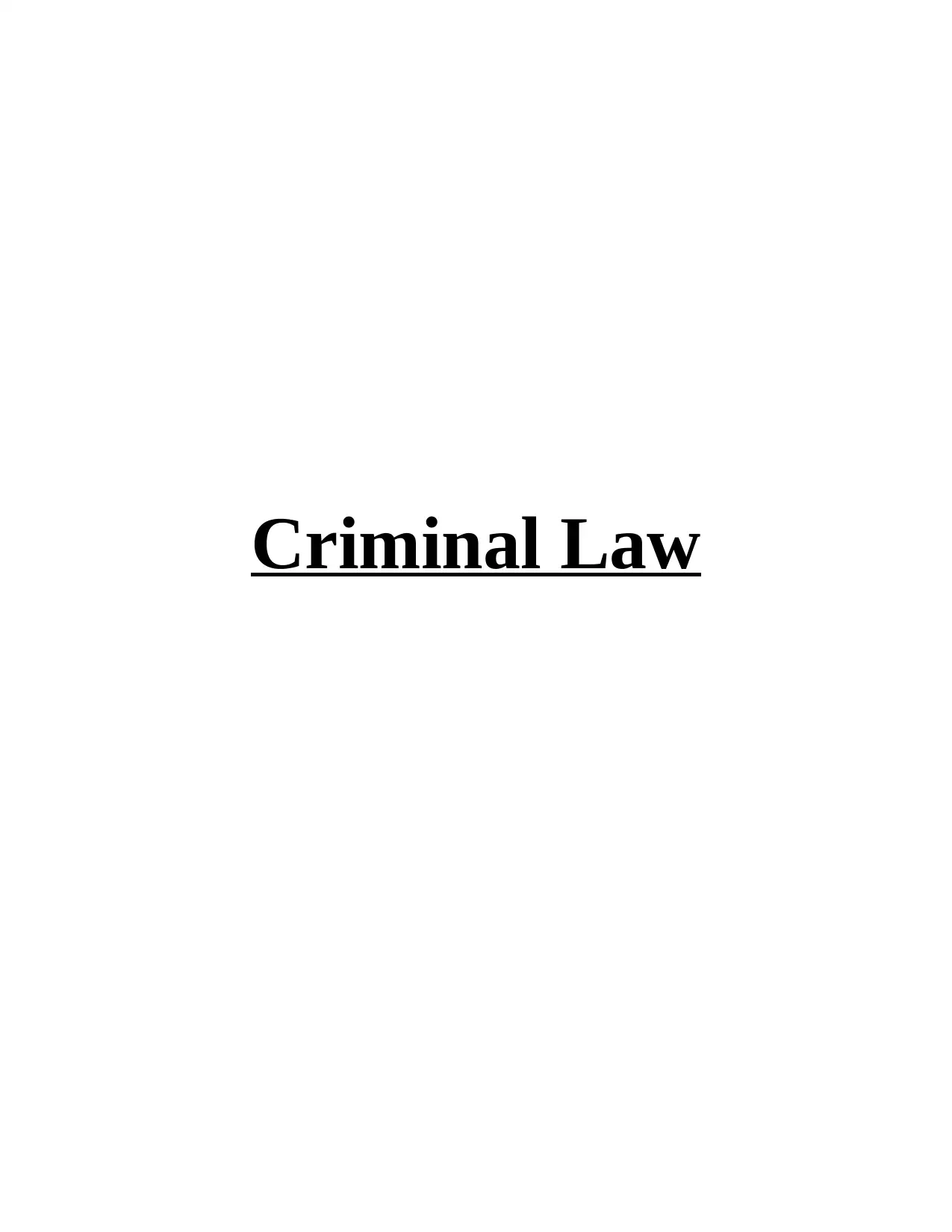
Criminal Law
Paraphrase This Document
Need a fresh take? Get an instant paraphrase of this document with our AI Paraphraser

Table of Contents
INTRODUCTION...........................................................................................................................1
MAIN BODY..................................................................................................................................1
CONCLUSION................................................................................................................................3
REFERENCES................................................................................................................................4
INTRODUCTION...........................................................................................................................1
MAIN BODY..................................................................................................................................1
CONCLUSION................................................................................................................................3
REFERENCES................................................................................................................................4
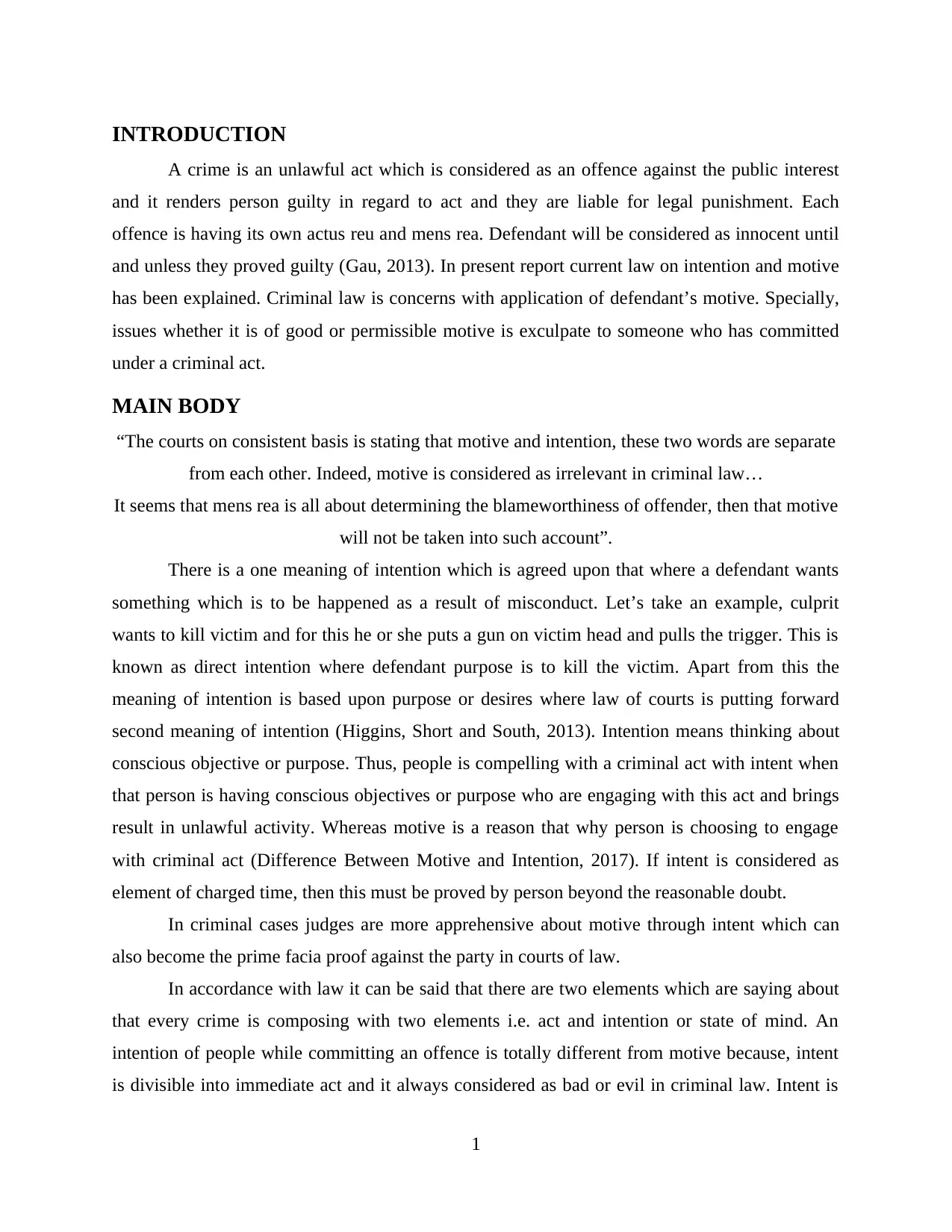
INTRODUCTION
A crime is an unlawful act which is considered as an offence against the public interest
and it renders person guilty in regard to act and they are liable for legal punishment. Each
offence is having its own actus reu and mens rea. Defendant will be considered as innocent until
and unless they proved guilty (Gau, 2013). In present report current law on intention and motive
has been explained. Criminal law is concerns with application of defendant’s motive. Specially,
issues whether it is of good or permissible motive is exculpate to someone who has committed
under a criminal act.
MAIN BODY
“The courts on consistent basis is stating that motive and intention, these two words are separate
from each other. Indeed, motive is considered as irrelevant in criminal law…
It seems that mens rea is all about determining the blameworthiness of offender, then that motive
will not be taken into such account”.
There is a one meaning of intention which is agreed upon that where a defendant wants
something which is to be happened as a result of misconduct. Let’s take an example, culprit
wants to kill victim and for this he or she puts a gun on victim head and pulls the trigger. This is
known as direct intention where defendant purpose is to kill the victim. Apart from this the
meaning of intention is based upon purpose or desires where law of courts is putting forward
second meaning of intention (Higgins, Short and South, 2013). Intention means thinking about
conscious objective or purpose. Thus, people is compelling with a criminal act with intent when
that person is having conscious objectives or purpose who are engaging with this act and brings
result in unlawful activity. Whereas motive is a reason that why person is choosing to engage
with criminal act (Difference Between Motive and Intention, 2017). If intent is considered as
element of charged time, then this must be proved by person beyond the reasonable doubt.
In criminal cases judges are more apprehensive about motive through intent which can
also become the prime facia proof against the party in courts of law.
In accordance with law it can be said that there are two elements which are saying about
that every crime is composing with two elements i.e. act and intention or state of mind. An
intention of people while committing an offence is totally different from motive because, intent
is divisible into immediate act and it always considered as bad or evil in criminal law. Intent is
1
A crime is an unlawful act which is considered as an offence against the public interest
and it renders person guilty in regard to act and they are liable for legal punishment. Each
offence is having its own actus reu and mens rea. Defendant will be considered as innocent until
and unless they proved guilty (Gau, 2013). In present report current law on intention and motive
has been explained. Criminal law is concerns with application of defendant’s motive. Specially,
issues whether it is of good or permissible motive is exculpate to someone who has committed
under a criminal act.
MAIN BODY
“The courts on consistent basis is stating that motive and intention, these two words are separate
from each other. Indeed, motive is considered as irrelevant in criminal law…
It seems that mens rea is all about determining the blameworthiness of offender, then that motive
will not be taken into such account”.
There is a one meaning of intention which is agreed upon that where a defendant wants
something which is to be happened as a result of misconduct. Let’s take an example, culprit
wants to kill victim and for this he or she puts a gun on victim head and pulls the trigger. This is
known as direct intention where defendant purpose is to kill the victim. Apart from this the
meaning of intention is based upon purpose or desires where law of courts is putting forward
second meaning of intention (Higgins, Short and South, 2013). Intention means thinking about
conscious objective or purpose. Thus, people is compelling with a criminal act with intent when
that person is having conscious objectives or purpose who are engaging with this act and brings
result in unlawful activity. Whereas motive is a reason that why person is choosing to engage
with criminal act (Difference Between Motive and Intention, 2017). If intent is considered as
element of charged time, then this must be proved by person beyond the reasonable doubt.
In criminal cases judges are more apprehensive about motive through intent which can
also become the prime facia proof against the party in courts of law.
In accordance with law it can be said that there are two elements which are saying about
that every crime is composing with two elements i.e. act and intention or state of mind. An
intention of people while committing an offence is totally different from motive because, intent
is divisible into immediate act and it always considered as bad or evil in criminal law. Intent is
1
⊘ This is a preview!⊘
Do you want full access?
Subscribe today to unlock all pages.

Trusted by 1+ million students worldwide
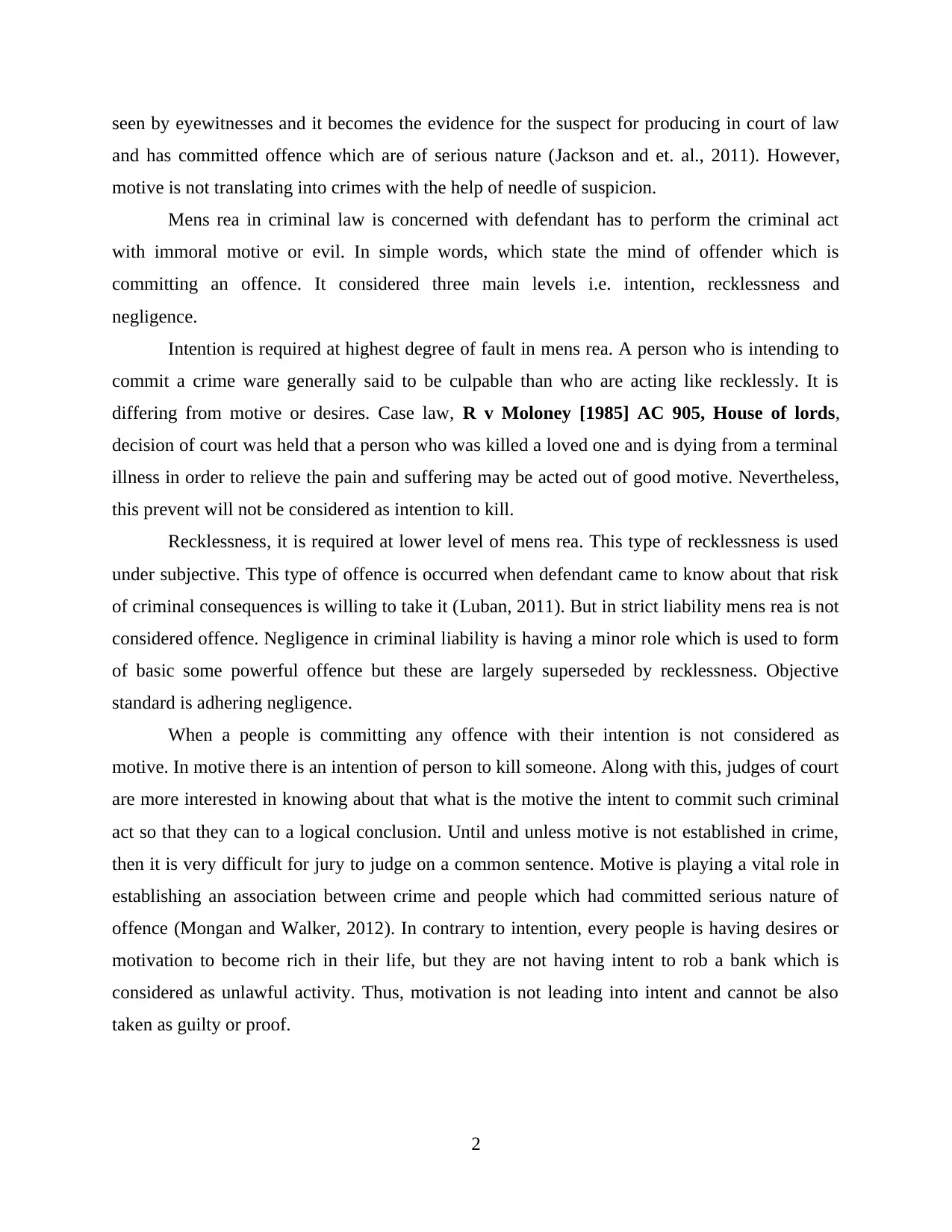
seen by eyewitnesses and it becomes the evidence for the suspect for producing in court of law
and has committed offence which are of serious nature (Jackson and et. al., 2011). However,
motive is not translating into crimes with the help of needle of suspicion.
Mens rea in criminal law is concerned with defendant has to perform the criminal act
with immoral motive or evil. In simple words, which state the mind of offender which is
committing an offence. It considered three main levels i.e. intention, recklessness and
negligence.
Intention is required at highest degree of fault in mens rea. A person who is intending to
commit a crime ware generally said to be culpable than who are acting like recklessly. It is
differing from motive or desires. Case law, R v Moloney [1985] AC 905, House of lords,
decision of court was held that a person who was killed a loved one and is dying from a terminal
illness in order to relieve the pain and suffering may be acted out of good motive. Nevertheless,
this prevent will not be considered as intention to kill.
Recklessness, it is required at lower level of mens rea. This type of recklessness is used
under subjective. This type of offence is occurred when defendant came to know about that risk
of criminal consequences is willing to take it (Luban, 2011). But in strict liability mens rea is not
considered offence. Negligence in criminal liability is having a minor role which is used to form
of basic some powerful offence but these are largely superseded by recklessness. Objective
standard is adhering negligence.
When a people is committing any offence with their intention is not considered as
motive. In motive there is an intention of person to kill someone. Along with this, judges of court
are more interested in knowing about that what is the motive the intent to commit such criminal
act so that they can to a logical conclusion. Until and unless motive is not established in crime,
then it is very difficult for jury to judge on a common sentence. Motive is playing a vital role in
establishing an association between crime and people which had committed serious nature of
offence (Mongan and Walker, 2012). In contrary to intention, every people is having desires or
motivation to become rich in their life, but they are not having intent to rob a bank which is
considered as unlawful activity. Thus, motivation is not leading into intent and cannot be also
taken as guilty or proof.
2
and has committed offence which are of serious nature (Jackson and et. al., 2011). However,
motive is not translating into crimes with the help of needle of suspicion.
Mens rea in criminal law is concerned with defendant has to perform the criminal act
with immoral motive or evil. In simple words, which state the mind of offender which is
committing an offence. It considered three main levels i.e. intention, recklessness and
negligence.
Intention is required at highest degree of fault in mens rea. A person who is intending to
commit a crime ware generally said to be culpable than who are acting like recklessly. It is
differing from motive or desires. Case law, R v Moloney [1985] AC 905, House of lords,
decision of court was held that a person who was killed a loved one and is dying from a terminal
illness in order to relieve the pain and suffering may be acted out of good motive. Nevertheless,
this prevent will not be considered as intention to kill.
Recklessness, it is required at lower level of mens rea. This type of recklessness is used
under subjective. This type of offence is occurred when defendant came to know about that risk
of criminal consequences is willing to take it (Luban, 2011). But in strict liability mens rea is not
considered offence. Negligence in criminal liability is having a minor role which is used to form
of basic some powerful offence but these are largely superseded by recklessness. Objective
standard is adhering negligence.
When a people is committing any offence with their intention is not considered as
motive. In motive there is an intention of person to kill someone. Along with this, judges of court
are more interested in knowing about that what is the motive the intent to commit such criminal
act so that they can to a logical conclusion. Until and unless motive is not established in crime,
then it is very difficult for jury to judge on a common sentence. Motive is playing a vital role in
establishing an association between crime and people which had committed serious nature of
offence (Mongan and Walker, 2012). In contrary to intention, every people is having desires or
motivation to become rich in their life, but they are not having intent to rob a bank which is
considered as unlawful activity. Thus, motivation is not leading into intent and cannot be also
taken as guilty or proof.
2
Paraphrase This Document
Need a fresh take? Get an instant paraphrase of this document with our AI Paraphraser
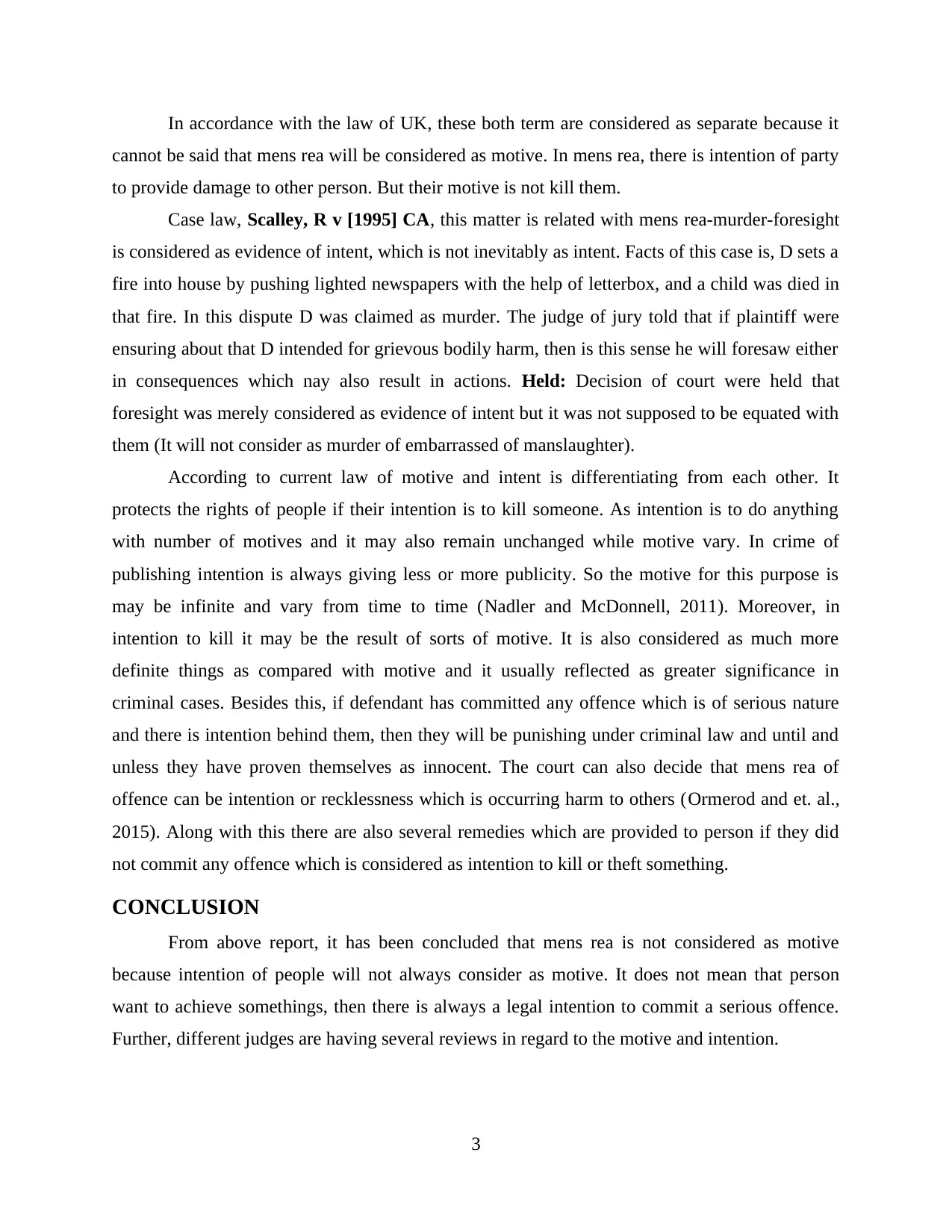
In accordance with the law of UK, these both term are considered as separate because it
cannot be said that mens rea will be considered as motive. In mens rea, there is intention of party
to provide damage to other person. But their motive is not kill them.
Case law, Scalley, R v [1995] CA, this matter is related with mens rea-murder-foresight
is considered as evidence of intent, which is not inevitably as intent. Facts of this case is, D sets a
fire into house by pushing lighted newspapers with the help of letterbox, and a child was died in
that fire. In this dispute D was claimed as murder. The judge of jury told that if plaintiff were
ensuring about that D intended for grievous bodily harm, then is this sense he will foresaw either
in consequences which nay also result in actions. Held: Decision of court were held that
foresight was merely considered as evidence of intent but it was not supposed to be equated with
them (It will not consider as murder of embarrassed of manslaughter).
According to current law of motive and intent is differentiating from each other. It
protects the rights of people if their intention is to kill someone. As intention is to do anything
with number of motives and it may also remain unchanged while motive vary. In crime of
publishing intention is always giving less or more publicity. So the motive for this purpose is
may be infinite and vary from time to time (Nadler and McDonnell, 2011). Moreover, in
intention to kill it may be the result of sorts of motive. It is also considered as much more
definite things as compared with motive and it usually reflected as greater significance in
criminal cases. Besides this, if defendant has committed any offence which is of serious nature
and there is intention behind them, then they will be punishing under criminal law and until and
unless they have proven themselves as innocent. The court can also decide that mens rea of
offence can be intention or recklessness which is occurring harm to others (Ormerod and et. al.,
2015). Along with this there are also several remedies which are provided to person if they did
not commit any offence which is considered as intention to kill or theft something.
CONCLUSION
From above report, it has been concluded that mens rea is not considered as motive
because intention of people will not always consider as motive. It does not mean that person
want to achieve somethings, then there is always a legal intention to commit a serious offence.
Further, different judges are having several reviews in regard to the motive and intention.
3
cannot be said that mens rea will be considered as motive. In mens rea, there is intention of party
to provide damage to other person. But their motive is not kill them.
Case law, Scalley, R v [1995] CA, this matter is related with mens rea-murder-foresight
is considered as evidence of intent, which is not inevitably as intent. Facts of this case is, D sets a
fire into house by pushing lighted newspapers with the help of letterbox, and a child was died in
that fire. In this dispute D was claimed as murder. The judge of jury told that if plaintiff were
ensuring about that D intended for grievous bodily harm, then is this sense he will foresaw either
in consequences which nay also result in actions. Held: Decision of court were held that
foresight was merely considered as evidence of intent but it was not supposed to be equated with
them (It will not consider as murder of embarrassed of manslaughter).
According to current law of motive and intent is differentiating from each other. It
protects the rights of people if their intention is to kill someone. As intention is to do anything
with number of motives and it may also remain unchanged while motive vary. In crime of
publishing intention is always giving less or more publicity. So the motive for this purpose is
may be infinite and vary from time to time (Nadler and McDonnell, 2011). Moreover, in
intention to kill it may be the result of sorts of motive. It is also considered as much more
definite things as compared with motive and it usually reflected as greater significance in
criminal cases. Besides this, if defendant has committed any offence which is of serious nature
and there is intention behind them, then they will be punishing under criminal law and until and
unless they have proven themselves as innocent. The court can also decide that mens rea of
offence can be intention or recklessness which is occurring harm to others (Ormerod and et. al.,
2015). Along with this there are also several remedies which are provided to person if they did
not commit any offence which is considered as intention to kill or theft something.
CONCLUSION
From above report, it has been concluded that mens rea is not considered as motive
because intention of people will not always consider as motive. It does not mean that person
want to achieve somethings, then there is always a legal intention to commit a serious offence.
Further, different judges are having several reviews in regard to the motive and intention.
3
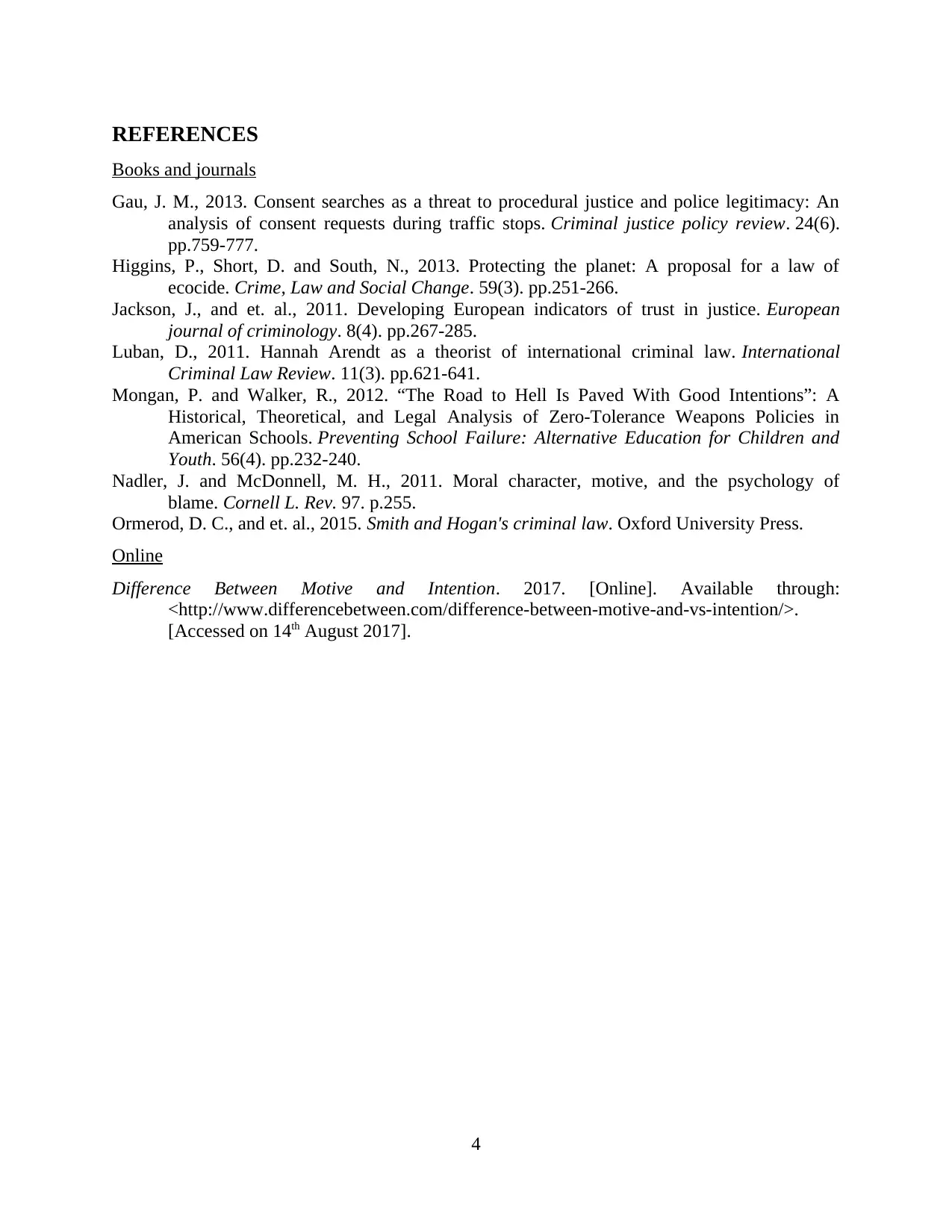
REFERENCES
Books and journals
Gau, J. M., 2013. Consent searches as a threat to procedural justice and police legitimacy: An
analysis of consent requests during traffic stops. Criminal justice policy review. 24(6).
pp.759-777.
Higgins, P., Short, D. and South, N., 2013. Protecting the planet: A proposal for a law of
ecocide. Crime, Law and Social Change. 59(3). pp.251-266.
Jackson, J., and et. al., 2011. Developing European indicators of trust in justice. European
journal of criminology. 8(4). pp.267-285.
Luban, D., 2011. Hannah Arendt as a theorist of international criminal law. International
Criminal Law Review. 11(3). pp.621-641.
Mongan, P. and Walker, R., 2012. “The Road to Hell Is Paved With Good Intentions”: A
Historical, Theoretical, and Legal Analysis of Zero-Tolerance Weapons Policies in
American Schools. Preventing School Failure: Alternative Education for Children and
Youth. 56(4). pp.232-240.
Nadler, J. and McDonnell, M. H., 2011. Moral character, motive, and the psychology of
blame. Cornell L. Rev. 97. p.255.
Ormerod, D. C., and et. al., 2015. Smith and Hogan's criminal law. Oxford University Press.
Online
Difference Between Motive and Intention. 2017. [Online]. Available through:
<http://www.differencebetween.com/difference-between-motive-and-vs-intention/>.
[Accessed on 14th August 2017].
4
Books and journals
Gau, J. M., 2013. Consent searches as a threat to procedural justice and police legitimacy: An
analysis of consent requests during traffic stops. Criminal justice policy review. 24(6).
pp.759-777.
Higgins, P., Short, D. and South, N., 2013. Protecting the planet: A proposal for a law of
ecocide. Crime, Law and Social Change. 59(3). pp.251-266.
Jackson, J., and et. al., 2011. Developing European indicators of trust in justice. European
journal of criminology. 8(4). pp.267-285.
Luban, D., 2011. Hannah Arendt as a theorist of international criminal law. International
Criminal Law Review. 11(3). pp.621-641.
Mongan, P. and Walker, R., 2012. “The Road to Hell Is Paved With Good Intentions”: A
Historical, Theoretical, and Legal Analysis of Zero-Tolerance Weapons Policies in
American Schools. Preventing School Failure: Alternative Education for Children and
Youth. 56(4). pp.232-240.
Nadler, J. and McDonnell, M. H., 2011. Moral character, motive, and the psychology of
blame. Cornell L. Rev. 97. p.255.
Ormerod, D. C., and et. al., 2015. Smith and Hogan's criminal law. Oxford University Press.
Online
Difference Between Motive and Intention. 2017. [Online]. Available through:
<http://www.differencebetween.com/difference-between-motive-and-vs-intention/>.
[Accessed on 14th August 2017].
4
⊘ This is a preview!⊘
Do you want full access?
Subscribe today to unlock all pages.

Trusted by 1+ million students worldwide
1 out of 6
Related Documents
Your All-in-One AI-Powered Toolkit for Academic Success.
+13062052269
info@desklib.com
Available 24*7 on WhatsApp / Email
![[object Object]](/_next/static/media/star-bottom.7253800d.svg)
Unlock your academic potential
Copyright © 2020–2025 A2Z Services. All Rights Reserved. Developed and managed by ZUCOL.





